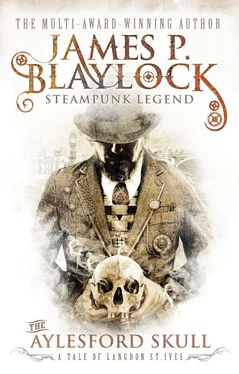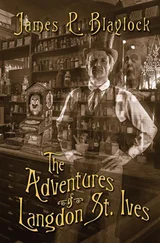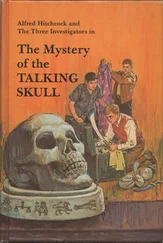James Blaylock - The Aylesford Skull
Здесь есть возможность читать онлайн «James Blaylock - The Aylesford Skull» весь текст электронной книги совершенно бесплатно (целиком полную версию без сокращений). В некоторых случаях можно слушать аудио, скачать через торрент в формате fb2 и присутствует краткое содержание. Жанр: sf_stimpank, на английском языке. Описание произведения, (предисловие) а так же отзывы посетителей доступны на портале библиотеки ЛибКат.
- Название:The Aylesford Skull
- Автор:
- Жанр:
- Год:неизвестен
- ISBN:нет данных
- Рейтинг книги:5 / 5. Голосов: 1
-
Избранное:Добавить в избранное
- Отзывы:
-
Ваша оценка:
- 100
- 1
- 2
- 3
- 4
- 5
The Aylesford Skull: краткое содержание, описание и аннотация
Предлагаем к чтению аннотацию, описание, краткое содержание или предисловие (зависит от того, что написал сам автор книги «The Aylesford Skull»). Если вы не нашли необходимую информацию о книге — напишите в комментариях, мы постараемся отыскать её.
The Aylesford Skull — читать онлайн бесплатно полную книгу (весь текст) целиком
Ниже представлен текст книги, разбитый по страницам. Система сохранения места последней прочитанной страницы, позволяет с удобством читать онлайн бесплатно книгу «The Aylesford Skull», без необходимости каждый раз заново искать на чём Вы остановились. Поставьте закладку, и сможете в любой момент перейти на страницу, на которой закончили чтение.
Интервал:
Закладка:
“I pray it won’t be soon,” he had replied, and had turned away, feeling shabbier than he remembered having felt in his life up until that time. After a period of reflection, however, it seemed to him that he might have played the fool in the matter – not his favorite instrument. The complications of the whole thing were rather too complicated to seem quite right to him now, and it had the earmarks of a plot, although the nature of the plot was beyond his grasp. He caught sight of his image in the window glass now, and saw that he looked even more craggy than usual, his long face careworn and drawn. He sat up, taking his long legs from the ottoman, suddenly restless.
He heartily wished that he were at home in Aylesford, with Alice and the children. Soon he would be, he told himself, and he looked at his pocket watch for the third time in the last half hour. The next train on the Medway Valley Line of the South Eastern Railway left Tooley Street Station in two hours, and he meant to be on it. He wouldn’t be home by suppertime, perhaps, but something very near.
He realized that his friend Tubby Frobisher was engaged in an argument with Secretary Parsons, heated on Parsons’s side – Parsons being disagreeable by nature – and ironic on Tubby’s, whose single-minded goal was to irritate Parsons. Parsons was an old man, humorless, stooped, and narrow-shouldered. His eyebrows were heavy and wild, which gave his face a fierce appearance. There was nothing at all fierce about Tubby, whose name was perfectly appropriate, although his enormous girth and cheerful demeanor sometimes mislead his enemies into thinking that he wasn’t both quick and ready to act.
“I tell you that Quittichunk’s Tablets have no virtue at all,” Parsons said, his face flushed and his beard quivering with passion. “Complete fraud. Medicinally inert if not poisonous.” He set his empty glass down and signaled for another bottle.
“Nonsense,” said Tubby. “My Uncle Gilbert swears by them. He’s an amateur sailor, you know. Docks his steam yacht in Eastbourne Harbour. He used to feed the tablets to me as a boy, before he’d allow me to go punting on the lake. I never suffered from a moment’s scurvy. You can have my affidavit on it.”
“On the bleeding lake ?” Parsons sputtered. “The man was raving.”
“Never,” Tubby said. “Quittichunk’s Tablets were efficacious there, too, you know – in the case of lunacy, that is to say. Uncle Gilbert ground them with a pestle and consumed the powder with a measured dose of whisky when he was tempted to run mad.”
Parsons blinked, speechless, his heavy features frozen into a rictus of bewildered loathing. The waiter brought the fresh bottle, which was beaded with moisture and apparently steaming cold. He poured it into Parsons’s glass, and the rush of ascending bubbles seemed to restore the man to partial equanimity.
“You remember Uncle Gilbert, Langdon?” Tubby said. “You can vouch for his sanity?”
“Indeed I can,” St. Ives replied. “As sane as you or I and with a measure left over.”
“I have no argument with that,” Parsons muttered.
St. Ives, in fact, would not swear an oath on the matter of Uncle Gilbert’s sanity, if it came down to it, although it was true that sanity was a difficult thing to define.
“Do you know that he’s come up from Dicker on a birding expedition in the Cliffe Marshes?” Tubby asked. “He’s keen on finding the great bustard, which have largely been shot out of existence.”
“He intends to bag the rest of them?” Parsons asked.
“Not Uncle Gilbert. He intends to count them. Goes off hunting with his binocle and a notebook. The bird was allegedly seen in the brushlands in the marshes by an amateur birder, although it might easily have been an enormous pheasant. Uncle Gilbert means to sort the bustard out. He’s setting up a bivouac above the bay. Another glass of this capital champagne?” Tubby asked St. Ives.
“No,” St. Ives said. “It’s wasted on me.”
“You were off your feed at lunch, I noticed. Pining for home and hearth again?”
St. Ives nodded, started to reply, but was abruptly distracted when it came into his mind that he had been promised begonia cuttings, and that he might have time to fetch them before leaving for the station. The thought perked him up considerably. Something good might come of this damnable two-weeks-long detour after all. Alice was a slave to begonias – one of her chief hobbyhorses. She could plant a fragment of a leaf in a pot of sand, and it would put down roots and produce fresh leaves in a fortnight. She would be doubly happy to see him if he arrived with cuttings, and, it seemed to him at that moment, her happiness was his own.
He bent forward and looked back out of the window, where he could see the glass roof of the conservatory, a small palm house kept by an ancient gardener named Jensen Shorter, recently the secretary of the Royal Horticultural Society. Shorter had seemed to decline in stature over the long years and was now as old as Moses and as tall as Commodore Nutt. The interior of the glass building appeared to St. Ives to be inordinately dark, given the bright afternoon, as if the coal oil heater were smoking, although why the heater would be on in midsummer was a poser. Shorter was a begonia fancier of the first water: rhizomatous exclusively, no gaudy tuberous show-offs. He had been given two-dozen new species from Brazil a year ago, but he wouldn’t hear of parting with any of the plants until his cuttings had flourished. Given that he hadn’t taken the lot of them out to the gardens at Chiswick, it wouldn’t take ten minutes for Shorter to snip off a few pieces of rhizome, which would ride home snugly in various coat pockets.
St. Ives stood up decidedly. “Good day to you both,” he said. “I’ve got to see Shorter about begonia cuttings before I set out for Tooley Street.”
“ Begonias ,” said Parsons dismissively, “I don’t fancy them myself. Hairy damned abominations, like something out of a nightmare.”
“I couldn’t agree more,” St. Ives said, shaking the man’s hand. “Please convey my apologies to the Society for the way this business of Banks’s notebooks fell out. I would have had it turn out in any other way than it did.”
“As would I,” Parsons said, shaking his head and scowling. “The loss in money is troubling enough, not to mention the reputation of the Society, but that’s the least of it. Forty-seven original drawings by the greatest botanist of his age reduced to muddy rubbish! Still, no one’s suggesting that you were careless in the matter. Time and chance happeneth to all of us, eh? Some of us perhaps more often than others. All the more reason to put it behind us, as they say.”
“Time and chance it will have to be,” St. Ives said, seeing that Tubby had a dangerous look about him, as if he were on the verge of committing an act of violence against Secretary Parsons. “I’ll just be off, then. Tubby, give my best to Chingford.”
“I’ll do that,” Tubby said. “I’m on my way out myself, though. I’ll see you to the street.” He drank off the rest of his champagne, nodded darkly at Parsons, and put on his hat.
They passed through the book room, which was nearly empty, although it appeared to contain a high percentage of luminaries among the several men lounging at the tables. Lord Kelvin sat alone near the window, sketching something out on a piece of foolscap. St. Ives knew two of the others by reputation, both mad doctors, who sat nattering away in Latin; one of them a wild-eyed French phrenologist and the other a crackpot criminologist from Turin University named Lombroso, whose work with imbeciles had impressed certain members of the Royal Society, especially Secretary Parsons, who was happy with the idea that the greater part of the world’s population suffered from imbecility. St. Ives was currently inclined to include himself among that number.
Читать дальшеИнтервал:
Закладка:
Похожие книги на «The Aylesford Skull»
Представляем Вашему вниманию похожие книги на «The Aylesford Skull» списком для выбора. Мы отобрали схожую по названию и смыслу литературу в надежде предоставить читателям больше вариантов отыскать новые, интересные, ещё непрочитанные произведения.
Обсуждение, отзывы о книге «The Aylesford Skull» и просто собственные мнения читателей. Оставьте ваши комментарии, напишите, что Вы думаете о произведении, его смысле или главных героях. Укажите что конкретно понравилось, а что нет, и почему Вы так считаете.










